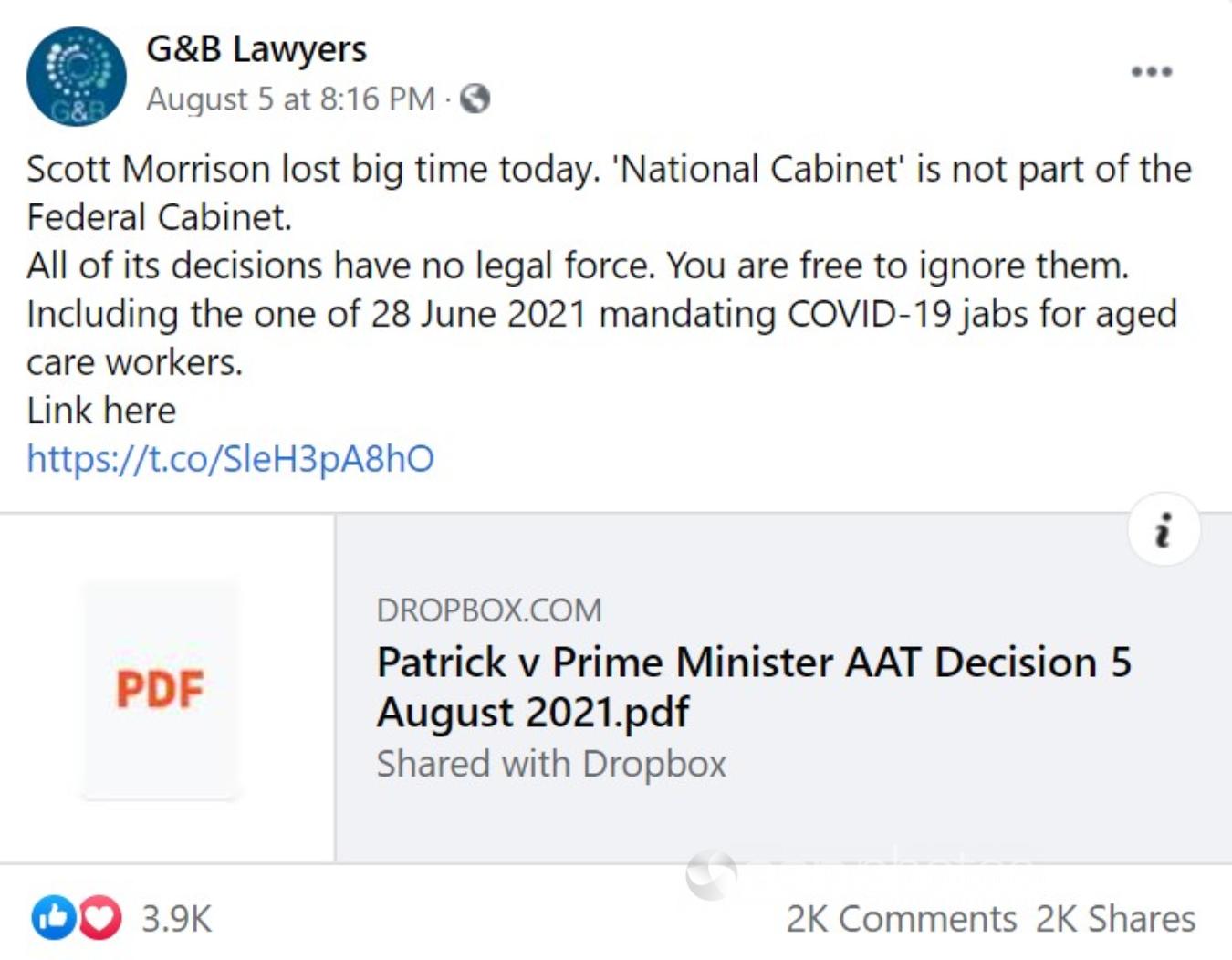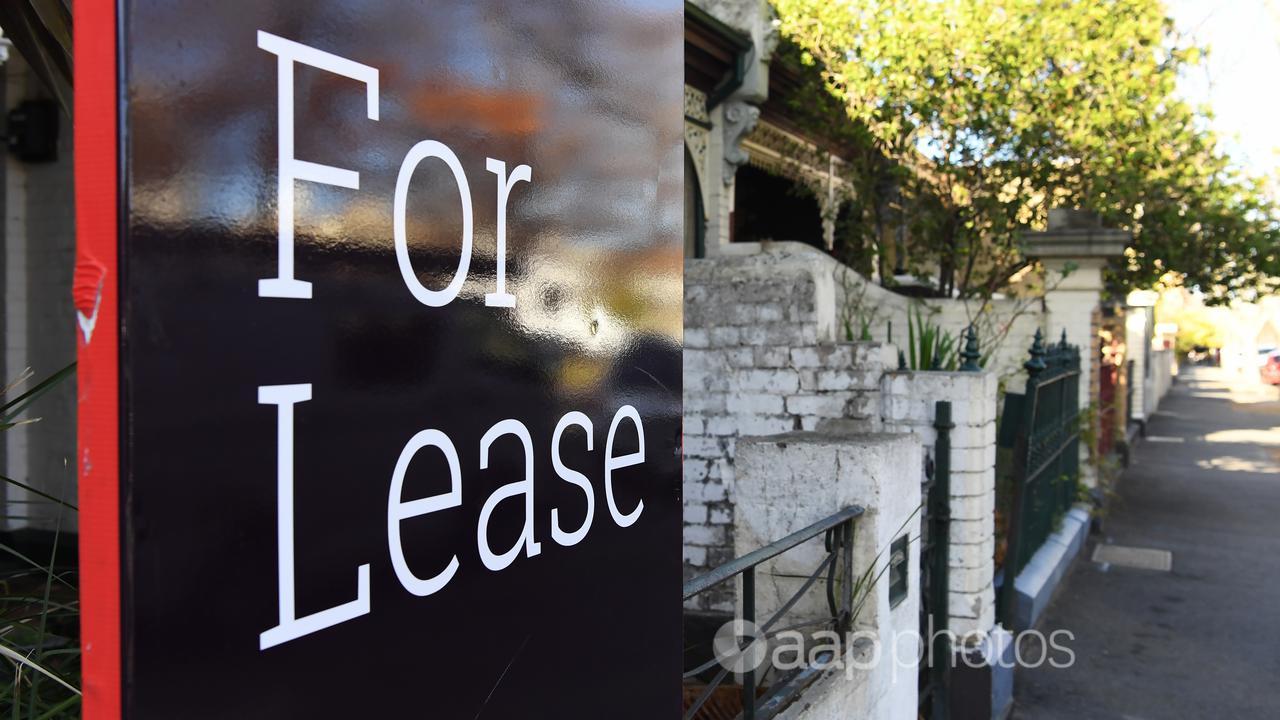The Statement
A Facebook post by a Sydney law firm claims that Australians can “ignore” all decisions made by the national cabinet due to the outcome of a case involving the federal government.
The August 5 post from G&B Lawyers says: “Scott Morrison lost big time today. ‘National Cabinet’ is not part of the Federal Cabinet. All of its decisions have no legal force. You are free to ignore them. Including the one of 28 June 2021 mandating COVID-19 jabs for aged care workers.”
In response to a user comment on the post, G&B Lawyers elaborates on the claim, adding: “Everything the National Cabinet ever decided and which the States implemented is arguably illegal.”
The post provides a link to an Administrative Appeal Tribunal (AAT) decision published earlier the same day. At the time of writing, the post had been shared more than 2000 times and viewed more than 185,000 times.
Similar claims have been made by several other Australian social media users, including here, here and here. Some of them refer to the G&B Lawyers Facebook post to support their claims.
G&B Lawyers has previously attracted attention for claiming COVID-19 vaccines do not work, as well as sharing misinformation about the effectiveness of PCR tests for COVID-19. The firm has also reportedly been soliciting donations for a legal challenge against vaccine mandates.

The Analysis
Constitutional experts have told AAP FactCheck that the national cabinet is a policy-making body, decisions of which are implemented by others. As such, experts say the tribunal ruling does not “in any way” impact on decisions made at the national cabinet.
The Administrative Appeal Tribunal case can be traced back to July 2020, when South Australian senator Rex Patrick lodged a Freedom of Information (FoI) request for documents relating to meetings of the national cabinet, an intergovernmental body created in March 2020 to replace the Council of Australian Governments (COAG).
The Department of Prime Minister and Cabinet refused access to the documents, arguing that the national cabinet – which consists of the prime minister plus Australia’s eight state and territory leaders – is a formal committee of the federal cabinet. The department said that, as such, national cabinet documents were exempt from FoI laws in the same way as other cabinet documents were exempt.
However, in its ruling of August 5, the tribunal disagreed with the department, noting that the national cabinet did not exhibit the core features of a government cabinet, such as collective responsibility and parliamentary accountability. As a result, the department was ordered to give Senator Patrick access to the documents he requested.
But while the judgment may have implications for the operation of the national cabinet, Anne Twomey, a constitutional law professor from the University of Sydney, told AAP FactCheck that it had no impact whatsoever on the validity of decisions made at the meetings.
“The important point to make is that the decisions of national cabinet never had any legally binding force,” Professor Twomey said in an email.
“Nor, for that matter, does a decision of the federal cabinet. They are just policy-making bodies whose decisions are implemented under the law by others who have the power to do so, such as a power conferred by a statute. The decision of the AAT in Senator Patrick’s case makes no difference to this.”
Prof Twomey said while members of the national cabinet agree on “general strategies, standards and principles”, any new policies they agree must be implemented in their own jurisdictions under state and territory laws.
“None of those actions or orders are affected in any way by the decision that the national cabinet is not a committee of the federal cabinet.”
A second constitutional law expert, UNSW professor George Williams, agreed that the ruling did not negate the legal status of decisions stemming from the national cabinet.
“(National cabinet) is merely a meeting point for the nation’s leaders. As such, national cabinet has no power to make laws or enforce rules. Instead, this is left to federal and state ministers and parliaments,” he told AAP FactCheck via email.
“The ruling has no impact upon them, meaning that the measures they have introduced to combat the pandemic are unaffected and remain in force.”
The Facebook post mentions an agreement made by the national cabinet on June 28 that all aged care workers must be vaccinated against COVID-19 as an example of the decisions that people could ignore following the ruling.
However, the agreement to vaccinate aged care workers in fact highlights how national cabinet agreements filter down to state and territory levels.
As described in this Department of Health briefing note, it is “at the discretion of states and territories” to determine the scope of the new rules and “give effect to the national cabinet decision”.
“As much as possible, these directions will be aligned to ensure consistency across state borders”, the briefing note says.
Prof Williams cautioned against following any advice that suggested people were legally entitled to ignore public health measures.
“Any person who ignores a public health order or other rule remains subject to penalties, sometimes including imprisonment, under those rules,” he said.
The Verdict
Australian constitutional experts told AAP FactCheck that the tribunal ruling did not invalidate decisions made at the national cabinet, as claimed.
The national cabinet is a policy-making body and, like the federal cabinet, does not itself implement new laws. Any policies agreed at the national cabinet require implementation by governments under their respective powers to make laws and issue directives. The tribunal ruling has no impact on the validity or legality of any of these policies.
False – Content that has no basis in fact.
* AAP FactCheck is an accredited member of the International Fact-Checking Network. To keep up with our latest fact checks, follow us on Facebook and Twitter.
All information, text and images included on the AAP Websites is for personal use only and may not be re-written, copied, re-sold or re-distributed, framed, linked, shared onto social media or otherwise used whether for compensation of any kind or not, unless you have the prior written permission of AAP. For more information, please refer to our standard terms and conditions.


















